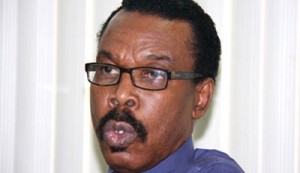“Cashless policy is still below expectation” – Bismarck Rewane
 Exactly 10 months after the pilot phase of cash-less policy commenced in Lagos, Managing Director/Chief Executive Officer, Financial Derivatives Company Limited (FDC), Mr. Bismarck Rewane, has expressed concern over the low level of acceptance of the policy.
Exactly 10 months after the pilot phase of cash-less policy commenced in Lagos, Managing Director/Chief Executive Officer, Financial Derivatives Company Limited (FDC), Mr. Bismarck Rewane, has expressed concern over the low level of acceptance of the policy.
Rewane stated this in his monthly economic news and views presented at the Lagos Business School’s executive breakfast meeting on October 3, a copy of which was made available to THISDAY at the weekend.
The FDC boss listed connectivity challenges with Point of Sale (PoS) terminals, Automated Teller Machines (ATMs) and mobile services as some of the factors obstructing the growth of the scheme.
“The level of debit card activities in the supermarkets and shopping malls up marginally, but still less than 3 per cent of total sales,” he said.
The cash-less policy aims at reducing the dominance of cash in the system by encouraging the use of alternative payment channels. Rewane had last month argued that adoption of PoS terminals was still below expectation and had said that only 10 per cent of the device was being used in Lagos.
Commenting on the global economy, the economist pointed out that Nigeria would set to benefit, if the Chinese economy avoids ‘hard landing,’ saying that 17.5 per cent of imports was from China in 2011.
“Likely ratings downgrade in emerging markets to affect terms of trade and investment flows. Inflow of hot money could lead to a domestic capital market bubble.”
On the proposal by President Goodluck Jonathan to keep the benchmark oil price of $75 while the National Assembly is recommending $82, Rewane described the benchmark as a theoretical level which determines fiscal savings from oil revenue.
“For example, if spot price is $100 and benchmark is $70, then savings is $30. The difference between revenue received and that available for spending, is the issue. Revenue saved is available for future spending and serves as a shock absorber for unexpected events. The monies saved go to the Excess Crude Account and the Sovereign Wealth Fund.
“The benchmark price is academic and not reality. Revenues received must be available for spending and harvesting. It’s raining today, so why keep the umbrella folded when there is a storm? Austerity at a time when stimulus is needed is economically counterproductive. Today is more important than the tomorrow that we do not know,” he argued.
Rewane who put the current level of Nigeria’s Foreign Direct Investment at $6.6 billion, stressed that excessive spending with limited absorptive capacity is financially inefficient as it leads to expenditure indigestion.
He also disclosed that the value of cheques eased to N1.52 trillion in August, compared with July’s value of N1.55 trillion.
Source: This Day




